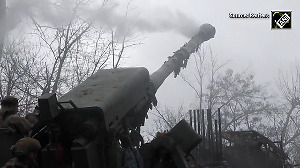The 434-km strategic Srinagar-Leh National Highway, connecting the Kashmir Valley with the Ladakh region, was thrown open for traffic on Sunday after being closed for over four months due to heavy snowfall.
The strategic road was closed for traffic in mid-December last year due to heavy accumulation of snow from Gagangir in Ganderbal district to Drass in Kargil district.
Photographs: S. Irfan/PTI Photo

Zojila Pass, at a height of 11,516 feet above sea level, connects the picturesque Kashmir Valley with the cold Indus valley desert through the 434-km long Srinagar-Leh road. Officials said the snow clearance operation was undertaken by the Border Road Organisation under Project Beacon from Gagangir to Zero Point (33 km from 75 km marker to 108 km). Under Project Vijayak, the road was cleared from Drass to Zero Point (39km from 108 km marker to 147 km), officials said. Project Beacon was completed on April 14, a day before Project Vijayak. Both operations began on March 5.

Lt Gen K J S Dhillon, the General Officer Commanding of 15 Corps, along with other officials, reopened the highway at a ceremony at Zero-Point at Zojila Pass. On the occasion, Lt Gen Dhillon complimented teams of both the projects for opening of the road. "I compliment the teams of both projects for opening of this road. This road is a lifeline for the people of Ladakh. It will help bring supplies and boost tourism," he said. The Corps Commander saluted the dedication, hard work and commitment of differently-abled lead dozer driver at Zojila, Anayatullah (fondly called Tulla) who has been working with Project Beacon since 1993.

"Dozers, earthmovers, wheel-loaders, snow cutters and other resources were deployed for completing the herculean task," officials said. The clearance operations were fraught with a number of dangers like avalanche threats, inclement weather and excessive snow accumulation of 30-40 feet at most places.

Adding to the difficulties, there was constant danger of still water freezing due to the low temperatures, officials said. Majority of the snow clearance was machine-driven, but the men behind the machines must be lauded for their efforts, they said. "As the roads were covered with thick snow, it was difficult to identify the road alignment. The teams were aided with navigational devices," they said.










 © 2025
© 2025